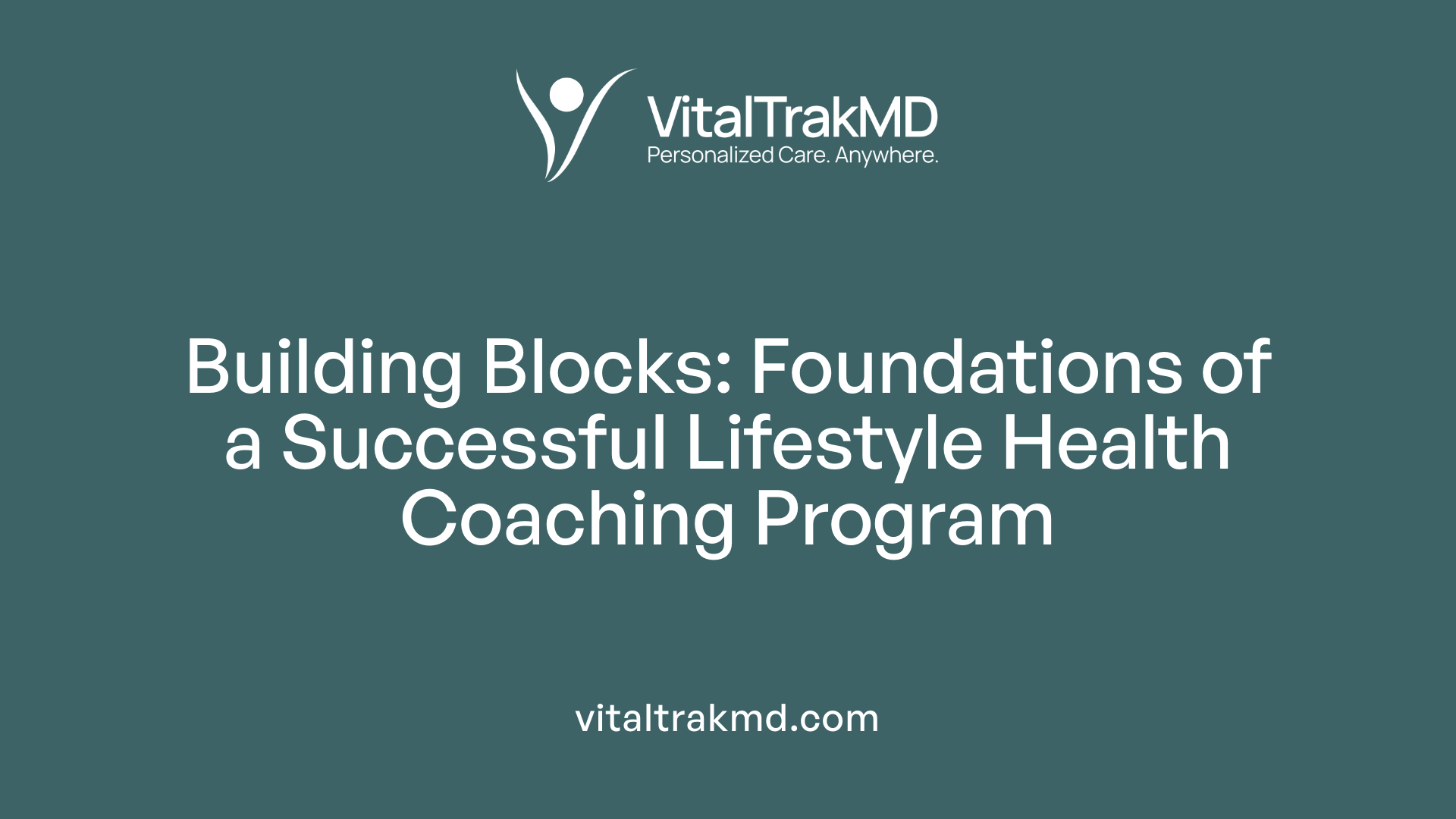How Lifestyle Coaching Is Integrated Into Chronic Care

Introduction to Integrating Lifestyle Coaching in Healthcare
In recent years, the integration of lifestyle coaching into chronic care has shown promising results in improving patient outcomes, reducing healthcare costs, and promoting holistic health management. This article explores how lifestyle coaching is embedded within healthcare systems, the roles of health coaches, the strategies employed, and the evidence supporting its effectiveness.
The Foundations of a Comprehensive Lifestyle Health Coaching Program

What is the structure of the LHC program and how is it delivered?
The lifestyle health coaching (LHC) program is designed as a thorough, evidence-based approach to promoting healthy behavioral changes. It starts with identifying participants through health risk assessments (HRA), which evaluate medical history, biometric measurements, lifestyle behaviors, and readiness to change. Participants are then stratified based on risk levels to tailor the coaching experience effectively.
Following assessment and stratification, individuals are enrolled in personalized coaching plans that focus on setting specific, realistic health goals. These goals are developed in line with clinical guidelines and focus areas such as physical activity, nutrition, weight management, tobacco cessation, and stress reduction. The coaching process emphasizes building sustainable habits, supported by behavioral models like motivational interviewing and stages of change.
Delivery of coaching services is flexible and accessible, utilizing various methods to meet different needs. Coaches communicate with participants via telephone, online chat, or email, allowing remote engagement that suits busy schedules and geographic barriers. This technological integration ensures that coaching can be provided at scale, maintaining quality through structured training and ongoing quality assurance measures for health coaches.
The program's design emphasizes a comprehensive, adaptable framework that can be implemented across diverse healthcare settings, accommodating cultural differences and specific community needs without compromising its core principles.
How is the program targeted to different populations?
The LHC program has been successfully adapted for a wide range of populations, primarily serving employees within large organizations, hospital patients, cardiac rehab participants, and individuals in various healthcare practices. Its flexible structure allows for modifications to fit cultural contexts, language differences, and local health norms, making it globally applicable.
By customizing coaching approaches and content, the program ensures relevance across different cultural backgrounds and health systems. This adaptability broadens its reach and improves its effectiveness in promoting healthy lifestyles worldwide.
The focus on personalization and cultural sensitivity enhances engagement and outcomes, demonstrating that a tailored, inclusive approach to lifestyle health coaching can successfully meet the needs of diverse populations.
Role and Functions of Health Coaches in Chronic Care Teams

What functions do health coaches serve within healthcare teams?
Health coaches are integral members of multidisciplinary healthcare teams, playing many vital roles. They provide personalized support to help patients manage their conditions better through self-management support, which includes education about their illnesses, medication adherence, and lifestyle changes.
They act as bridges in communication, clarifying treatment plans, lab results, and diagnoses to ensure patients understand their healthcare. Additionally, health coaches assist with navigating complex healthcare systems, helping patients schedule appointments, access community resources, and understand their options.
Emotional support is another key function, as coaches help reduce patient anxiety and isolation, fostering motivation and confidence. They serve as consistent, ongoing figures in patients’ health journeys, offering encouragement, checking progress, and adjusting strategies as needed.
Behavior change techniques, such as motivational interviewing and stages of change, are routinely employed to foster sustainable health habits. Their efforts aim to improve overall health outcomes, including better control of chronic diseases like diabetes and hypertension.
What are common models of health coaching?
Two well-established models illustrate how health coaching is seamlessly integrated into healthcare systems.
The teamlet model involves medical assistants or other health workers working closely with physicians. In this setup, they provide additional support, education, and follow-up, which enhances patient engagement and care quality.
Another prominent approach is the hospital-to-home model, exemplified by programs like the Care Transitions Intervention. Here, health coaches support patients discharged from hospitals by guiding them through medication management, follow-up appointments, and lifestyle adjustments to prevent readmissions.
Both models focus on empowering patients through ongoing, personalized support that complements medical treatment, ensuring holistic and continuous care.
Their role in multidisciplinary teams
Within comprehensive care teams, health coaches serve as key connectors among various healthcare providers. They facilitate collaboration between physicians, nurses, dietitians, social workers, and mental health professionals.
By acting as intermediaries, coaches ensure that patient-specific information and preferences are communicated effectively across disciplines. This integration fosters a more cohesive approach to chronic disease management and preventive care.
Their involvement enhances patient-centered care, improves adherence to treatments, and encourages lifestyle modifications, ultimately leading to better health outcomes across diverse populations.
Strategies and Techniques Used in Lifestyle Coaching for Chronic Disease Management

What strategies are employed by health coaches to support behavior change?
Health coaches use a variety of evidence-based approaches to encourage lasting lifestyle changes. They incorporate learning theories such as adult learning, which emphasizes self-directed and practical learning, and social learning, which highlights the importance of models and social influence. Motivational interviewing is a cornerstone technique that helps explore and resolve ambivalence, bolstering motivation.
Coaches tailor interventions based on the patient's readiness to change, often using the stages of change model. They set realistic, measurable goals and develop specific action plans focused on small behavioral steps. Addressing individual barriers—such as social, cultural, or environmental challenges—is crucial. Coaches consider individual cultural values, family dynamics, and social determinants to ensure strategies are relevant and feasible.
Techniques like teach-back and ask–tell–ask facilitate understanding, while regular, personalized check-ins help monitor progress. Emphasizing manageable changes—like adding a short daily walk or gradually improving diet—supports sustainable habits. These approaches not only motivate patients but also increase their confidence and commitment to their health.
How is personalized care achieved in lifestyle coaching?
Personalized care begins with a comprehensive initial assessment that covers medical history, lifestyle behaviors, biometric data, and readiness to change. This assessment helps coaches understand each patient's unique circumstances and goals.
Effective coaching relies heavily on ongoing feedback, collaborative goal setting, and regular adjustments to action plans. Coaches employ communication techniques such as teach-back, which confirms patient understanding, and ask–tell–ask, which involves patients in decision-making and reinforces learning.
Goals are always aligned with current clinical guidelines but are adapted to fit the individual’s cultural context, preferences, and social environment. By breaking down large health targets into small, achievable behavior changes—such as incorporating more vegetables into daily meals or increasing physical activity gradually—coaches empower patients, helping them build confidence and sustain improvements over time.
Evidence Supporting Effectiveness and Impact of Lifestyle Coaching in Chronic Disease Management

What evidence supports the effectiveness of lifestyle coaching in managing chronic diseases?
A substantial body of research, including over 100 scientific studies, supports the positive influence of lifestyle coaching on managing chronic health conditions. Randomized controlled trials and systematic reviews have consistently shown that structured coaching interventions lead to significant improvements in critical health risk factors such as blood pressure, cholesterol levels, fasting glucose, and body weight.
For example, studies from institutions like Brigham and Women’s Hospital highlight that patients with diabetes who receive regular lifestyle counseling reach their blood glucose, blood pressure, and lipid targets much faster—often within around 4 weeks—compared to months or even over a year with less frequent guidance.
Health coaching has also been linked to reductions in medication dependence, as patients improve control over their conditions through behavioral changes. Contributing to better clinical outcomes are evidenced improvements in mental health, including decreased depression and increased self-efficacy.
Furthermore, evidence from randomized trials and observational studies demonstrates that individualized coaching facilitates sustainable lifestyle modifications, including healthier eating, increased physical activity, weight management, and stress reduction. These changes collectively reduce the severity of chronic conditions such as hypertension, hyperlipidemia, and diabetes, ultimately leading to lower complication rates.
How do these benefits translate into healthcare cost savings?
Improved disease management through lifestyle coaching results in tangible economic benefits. By achieving better clinical control, patients often experience fewer hospital admissions, reduced need for medication adjustments, and fewer emergency visits.
This enhanced management decreases overall healthcare utilization, translating into reduced costs for healthcare systems. In the long term, coaching-driven improvements can prevent disease progression and complications, leading to fewer medical interventions and hospital stays.
Additionally, cost-effectiveness is supported by findings that, although initial investments in coaching may be higher, the decreased reliance on pharmacological treatments and emergency services offset these costs.
Thus, integrating lifestyle coaching into chronic disease care models not only benefits patient health but also promotes more sustainable resource use, making it a valuable component of comprehensive healthcare strategies.
Integration, Reimbursement, and Future Directions in Healthcare Systems
 Lifestyle coaching has become a vital component in chronic care management within healthcare systems. Its integration occurs through multidisciplinary teams and structured programs that include health coaches, physicians, dieticians, and mental health professionals working collaboratively. These programs often follow models like the Chronic Care Model, which emphasizes proactive, planned, and patient-centered care. Digital tools such as telehealth, remote monitoring, and mobile health applications further enhance access and engagement, allowing patients to receive coaching remotely, a practice particularly vital during the COVID-19 pandemic.
Lifestyle coaching has become a vital component in chronic care management within healthcare systems. Its integration occurs through multidisciplinary teams and structured programs that include health coaches, physicians, dieticians, and mental health professionals working collaboratively. These programs often follow models like the Chronic Care Model, which emphasizes proactive, planned, and patient-centered care. Digital tools such as telehealth, remote monitoring, and mobile health applications further enhance access and engagement, allowing patients to receive coaching remotely, a practice particularly vital during the COVID-19 pandemic.
Regarding reimbursement, systems like Medicare have recognized the value of lifestyle coaching. Under the Chronic Care Management (CCM) program, Medicare reimburses non-face-to-face coaching services for at least 20 minutes per patient monthly, making coaching financially sustainable for providers. Such policies encourage broader adoption and integration of coaching into routine care, promoting preventive health and chronic disease control.
Looking ahead, the future of lifestyle coaching in healthcare is promising. The workforce is expected to expand, with more professionals trained in coaching methods. Advances in mHealth, including personalized apps and digital coaching platforms, will play a larger role in supporting long-term behavior change. Additionally, a shift toward value-based care models will prioritize outcomes and holistic health, incorporating social determinants, mental health, and individual preferences into personalized interventions. This evolution envisions a healthcare system that not only treats diseases but actively promotes overall well-being and resilience through comprehensive lifestyle support.
Summary and Implications for Healthcare Practice
Integrating lifestyle coaching into chronic care has proven to be a transformative approach, supported by robust evidence demonstrating its benefits in enhancing patient outcomes and reducing healthcare costs. As healthcare continues to evolve toward a more holistic and patient-centered paradigm, the role of trained coaches, innovative models, and digital tools will expand, making lifestyle interventions an essential component of sustainable, effective chronic disease management. Emphasizing behavioral change, interdisciplinary collaboration, and personalized care can lead to a healthier future for individuals and healthcare systems alike.
References
- Clinical Effectiveness of Lifestyle Health Coaching: Case Study of an ...
- Health Coaching for Patients With Chronic Illness - AAFP
- Health Coaching: The science and art of behavior change
- The impact of health and wellness coaching on patient-important ...
- The Rise of Health Coaching: Turning Lifestyle into Medicine
- How Health Coaches Are Integral to Excellent Care - AFPA
- Health Coaching: Help Patients Take Charge of Their Health
- Integrating Health Coaching with Long-Term Condition Care
- The effects of health coaching on adult patients with chronic diseases
- What Is Health Coaching and Does It Help With Chronic Disease ...
Recent articles
Want to Feel Better and Live Healthier?
Join hundreds of patients taking control of their health with personalized care that fits their life – not the other way around.
Rated 4.8/5 by 32+ customers







